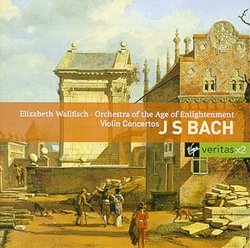| All Artists: Johann Sebastian Bach, Paul Nicholson, Orchestra of the Age of Enlightenment Title: Bach: Violin Concertos Members Wishing: 0 Total Copies: 0 Label: Virgin Veritas Release Date: 6/8/1999 Genre: Classical Styles: Forms & Genres, Concertos, Historical Periods, Baroque (c.1600-1750), Instruments, Reeds & Winds, Strings, Symphonies Number of Discs: 2 SwapaCD Credits: 2 UPC: 724356155824 |
Search - Johann Sebastian Bach, Paul Nicholson, Orchestra of the Age of Enlightenment :: Bach: Violin Concertos
 | Johann Sebastian Bach, Paul Nicholson, Orchestra of the Age of Enlightenment Bach: Violin Concertos Genre: Classical
|
Larger Image |
CD Details |
CD ReviewsA correction Mike G. | Cincinnati, Ohio | 02/05/2006 (5 out of 5 stars) "A couple reviews below addressed a "problem" with the pitch of the A minor concerto. For those of you reading this who aren't familiar with the period instrument movement, one of the features of period performance is a "reduction" of pitch from A440 to A415. It actually isn't a reduction, persay, because instruments of the baroque period played at or around this pitch, so in replicating the period style, this performance does as well. To a modern ear who is unfamiliar with this, the pitch does sound exactly a half step lower, so the A minor concerto does sound like an A-flat minor concerto, if your A is 440. I will leave other specifics to the other reviewers; I just wanted to point out the pitch issue." Solid Performance makes this Superb Value rodboomboom | Dearborn, Michigan United States | 01/31/2002 (5 out of 5 stars) "Proceeding from Bach's tenure in Cothern, this composer's three surviving violin concertos (1041-1043) are performed on this disc as well as reconstructions of 1064, 1044 and two other violin concertos as well as Concerto for Violin and Oboe.This is strong performance by the strings as well as flutist Beznosiuk, oboeist Robson and harpsichordist Nicholson. Under the direction of Wallfisch, this is organized around Vivaldi's three-movement system, but Bach breathes additional life in the pieces with the notable smoothness of the melodic lines as well as more substantive string parts.1042 is extremely well interpreted with its overlaying bass line coming through impressively. Fond also of the Double Concerto and the oboe and harpshichord work.This is great value set showing strong Italian influence upon Bach." Good incisive sensitive period performances, excellent sound rc_rc | Yorkshire, UK | 03/13/2006 (4 out of 5 stars) "I am both a modern- and a period- instrument fan in baroque music. I haven't found a truly great period performance of these works, but this is pretty close!
Admittedly my early experience of these works was formed by the great Arthur Grumiaux' modern instrument versions, not with the ( to my ears over-romantic ) Solistes Romandes, but an earlier (I think) more incisive performance with the English Chamber Orchestra, very hard to track down, which is wonderful. However, these performances come close, are beautifully and idiomatically played, the double-stopping passagework towards the end of the finale of the A minor concerto being suitably thrilling, and appropriate fast but not silly-fast tempos chosen, that work well with this orchestra. The reviewer who criticised the pitch fails to realise that musical documentation of 18th century Europe suggests that they played to a lower pitch then than they do today (and even this may have varied regionally!). If she wants to play along, may I suggest she retunes her instrument down a semitone - and then play in the key Bach likely expected it to be played in, and that which this period instrument orchestra have attempted to reproduce." |

 Track Listings (12) - Disc #1
Track Listings (12) - Disc #1